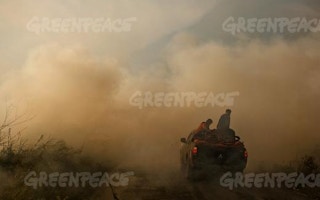Greenpeace International declared on Thursday that member companies of the Roundtable for Sustainable Palm Oil (RSPO) must be made accountable for forest fires in Indonesia, which caused the worst haze incident in Singapore and Malaysia in over a decade.
To continue reading, subscribe to Eco‑Business.
There's something for everyone. We offer a range of subscription plans.
- Access our stories and receive our Insights Weekly newsletter with the free EB Member plan.
- Unlock unlimited access to our content and archive with EB Circle.
- Publish your content with EB Premium.
The environmental organisation, analysing NASA hotspot data in Sumatra and recent photographic evidence, revealed that fire hotspots can be found in palm oil concessions owned by PT Inti Indosawit Subur’s Asian Agri and Wilmar International, both members of RSPO.
These two companies, however, were not under the recent investigation conducted by the sustainable palm oil group, said Greenpeace.
RSPO only requested the concession maps of the following companies: Sime Darby, Golden Agri Resources (GAR), Kuala Lumpur Kepong (KLK), Tabung Haji Plantations and PT Jatim Jaya Perkasa.
According to Bustar Maitar, head of the Indonesia Forest Campaign at Greenpeace International, “The RSPO decided to focus its own investigations on just five of its members, but Greenpeace’s evidence points to a far wider problem for the sector, which neither the RSPO nor the companies implicated are owning up to.”
Greenpeace said the palm oil group only assessed member companies that have been named in media reports; when in truth, these are not the companies with the most number of fire hotspots, nor do these companies amount to the 11 concessions discovered having more than four hotspots each.
For example, PT Raja Garuda Mas Sejati, a subsidiary of Singapore-based Asian Agri, has documented fires and 20 hotspots on peatland within its concession between 17 to 28 June.
Meanwhile, PT Jatim Jaya Perkasa, the only one of the five companies that did not submit concession maps to the RSPO, had almost 100 hotspots on peatland in its concession between 19 and 26 June, according to Greenpeace analysis.
PT Bumireksa Nusasejati, under the Malaysian-based Sime Darby group, also had more than 20 hotspots on peatlands between 17 and 28 June.
For Maitar: “Rather than claiming the innocence of members who’ve been reported in the media, the RSPO needs to address the real problem – years of peatland drainage and destruction which is labelled ‘sustainable’ under RSPO rules and has laid the foundation for these disastrous fires.”
He added, “The RSPO was established nearly a decade ago in the wake of the 1997 forest fires, yet to date, it has failed to tackle its members’ role in creating the conditions that lead to such disaster, nor has it held companies accountable for the impact of their operations. It’s time for individual palm oil companies to step up and set the bar higher than the RSPO.”
Greenpeace is calling on these corporations to take responsibility for their supply chains. They have to fully commit to zero deforestation and implement a ban on peat land development, which only contributes to air pollution in the region.








